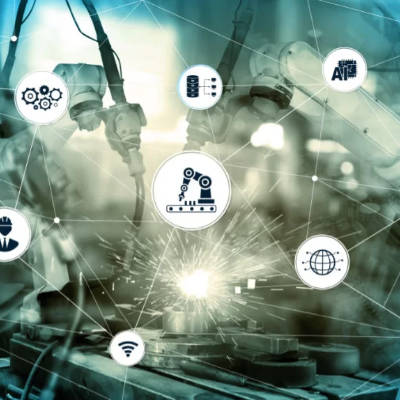
Internet of Things
Device communication and cooperation.
Internet of Things is a network constituted by objects equipped with sensors, software and other technologies that connect over the Internet. Devices connected within the Internet of Things are able to communicate, interact and realize complex tasks without human intervention. In practice the IoT technology allows one to collect data from multiple sources, which includes, among others, data concerning status of devices, level of consumption of electric power or other media. IoT devices may transmit data to a central system over the Internet and provide managers with the possibility of making decisions on the basis of reliable and up-to-date information. Equipment fitted with smart sensors is able to automatically adapt its operation to current situation, e.g. in order to optimize media consumption. Switching lights off automatically, when they are not needed, is a good example. By developing MES- class systems (Manufacturing Execution System), Quantum supports companies in rationalising processes on the basis of IoT.
Ground-breaking IoT technologies
The following should be mentioned among technologies and conditioning factors that contributed to the greatest extent to the creation of the Internet of Things:
- General availability of cheap and reliable sensors characterised by low power consumption levels.
- Automatic data identification.
- Wide range of network protocols that facilitate connectivity.
- Cloud computing platforms.
- Machine learning.
Internet of Things in a production plant
The technology of Industrial Internet of Things constitutes the foundation of the concept of Industry 4.0. Smart factories may implement IIoT in a variety of devices, in order to enhance efficiency, personnel safety and productivity.
How can IIoT support the operation of your plant? The following can be counted among IoT applications in industrial plants:
Smart Factory – data integration
Internet of Things allows one to connect production machines and IT systems used for production management. All the data may be collected and stored in one, central database. Access to aggregated data ensures that managers have comprehensive insight into plant operation. Managers in your company may check, when specific devices were in operation and determine their efficiency. They may also get insight into the amounts of used resources, number of manufactured units and many other data.
Power management in a plant
Industrial processes often consume considerable amounts of energy. Therefore, even small improvements in energy management may help industrial plants save large amounts of money and reduce negative environmental impact. Thanks to IIoT, managers of your company may get to understand better the structure of energy consumption within the entire production plant. They may also view specific information concerning consumption of energy by particular machines, which allows them to identify the less efficient ones. Thus, IIoT may help optimize energy consumption in the entire company. The data may also facilitate assessment of the profitability of introduction of renewable energy sources.
Predictive maintenance
Predictive maintenance is the most recent concept of organization of maintenance-related tasks in production plants. It substitutes successively the reactive methods (run to failure) that constituted in reacting to defects or failures, as they arise. Preventive maintenance also eliminates the classic preventive approach, based on a pre-established schedule of inspections and maintenance tasks. Acquisition of tools that allow you to reliably assess current condition of machines in your plant provides the basis for implementing the strategy of predictive maintenance. Collected information about the condition of machines is the starting point for historical data analyses that allow one to determine the risk and frequency of specific incidents.
Remote control
When machines and other devices are connected to the Internet, it becomes possible to control them from any location with network access. The ability to remotely control equipment may enhance the capability of your plant to adapt to varying conditions.
Internet of Things in warehousing and transport
IoT technologies are implemented more and more often in modern warehousing facilities and means of transport of our clients. The following are the most important benefits that you can draw by implementing IIoT in the management of commodities flow:
- Enhanced labour productivity and warehouse efficiency – smooth communication between humans and machines allows almost every logistic process to be rationalized.
- Predictive maintenance of warehousing equipment – machines fitted with sensors may autonomously notify the maintenance department about potential problems that threaten operational safety. This will additionally allow the efficiency of facility operation to be enhanced.
- Improved power efficiency – sensors connected to the Internet of Things may help reduce energy consumption.
- Safety – a network of interconnected elements constitutes one of the most effective methods of protecting warehouses against potential threats. Adequately designed sensors and monitoring units may, for instance, warn the personnel and notify relevant services, if need be.
- Strictly controlled temperature during transport.